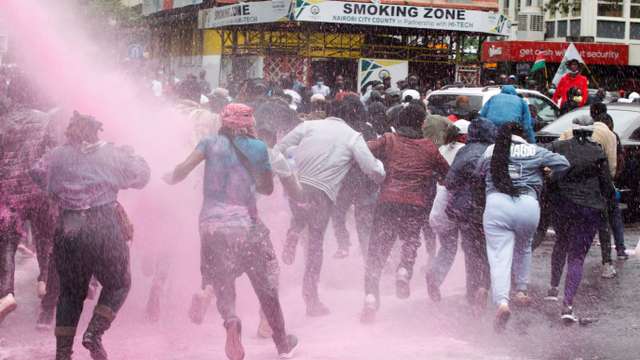EXPLAINER: Why Kenyan Gen-Zs are leading protests against new government tax measures

At least one person has been killed and some 200 people injured in nationwide protests in Kenya.
The protests are against additional proposed government taxes in the 2024/2025 Finance Bill. Protestors said the proposed taxes including a 16% tax on bread and a 2.5% tax on vehicles will worsen the economic plight of citizens and harm small businesses under William Ruto’s administration.
About the protests
The protests began on June 18 in Nairobi under the “Occupy Parliament banner”. It was led by Generation Z and human rights activists and spread to at least 18 counties, including Mombasa.
By June 20, the demonstrations had intensified, with clashes between protesters and police, resulting in deaths and injuries, including journalists and observers.

A 29-year-old man was killed during the protests. Reuters reports that the man sustained a thigh wound allegedly as a result of police shooting. He later died after being rushed to the hospital. The government earlier this week softened its stance with recommendations to scrap some of the new levies including car ownership taxes, bread, cooking oil taxes, and taxes on other financial transactions but public outrage remains high.
What is in the Finance Bill?
The Finance Bill proposed by government for the coming fiscal year aims to raise Ksh302 billion ($2.36 billion) through new taxes. The bill has some proposals that have been described as contentious by human rights activists and citizens.
It proposes among other things,
- A compulsory deduction of 3% of every employee's monthly wages capped at 5,000 shillings ($35,89) matched by the employer, towards a National Housing Development Fund.
- An increase of the value-added tax on fuel to 16%.
- Minimum top-up tax on certain resident entities that are members of multinational groups.
- A new withholding tax for digital content creators and online influencers at 15%.
- A tax on the transfer of cryptocurrency and non-fungible tokens at 3%.
- An increase in the top personal income rate from 30% to 35%. This will target persons with a monthly income of more than 500,000 shillings ($3,600).





- The bill removes taxes on helicopters and aircrafts and cuts the tax rate on rental income from 10% to 7.5%
Opposition MPs have rejected the Bill. After a meeting by President Ruto with MPs and Senators on June 20, the following amendments were announced.
The removal of a 16 % VAT on bread, transportation of sugar, financial services, foreign exchange transactions as well as the 2.5% Motor Vehicle Tax. It also removes increased taxes on mobile money transfers, and Excise Duty on vegetable oil.
Levies on the Housing Fund and the proposed one on Social Health Insurance will not attract income tax, putting much more money in the pockets of employees.
What they said
Many have commended the young generation (Gen-Z) for taking up the task of protesting against taxes they find contentious and detrimental to the economy.
Meanwhile, several other groups including human rights groups have described the conduct of the police as abusive and unacceptable. Amnesty International has accused the police of using excessive force to contain protesters, many of whom were arrested. ICJ Kenya, a human rights organisation has also described the police’s actions as “a gross violation of human rights”.